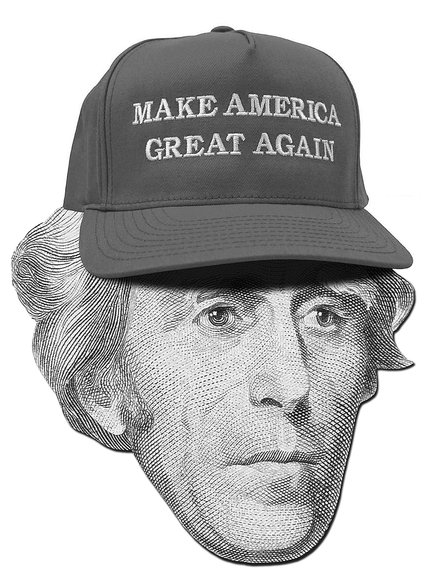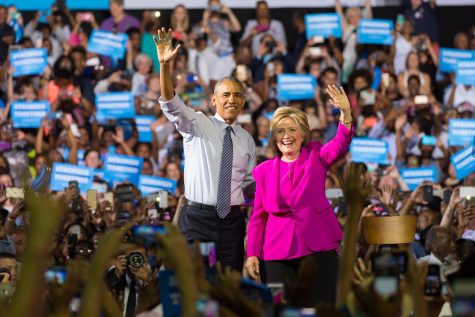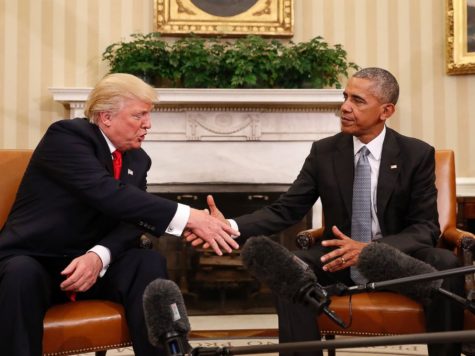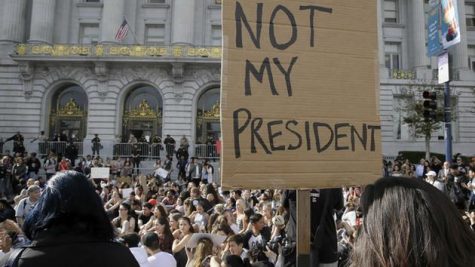Donald Trump: A Jacksonian Victory

(Photo – Matt Chase, New York Times)
For Americans, history has repeated itself once again and many of us don’t even realize it. On election night in the U.S., Republican nominee Donald Trump took America by storm with a surprise victory over Democratic rival Hillary Clinton. This result debunked all polls and pundits predicting for months Hillary Clinton’s victory. Perplexity loomed over the American people who could not explain how such a controversial and divisive candidate won the U.S. election. In contemplating this historical victory by Donald Trump, I could not help but see the uncanny and almost scary parallels between Donald Trump’s victory and that of Andrew Jackson in 1828. Donald Trump, much like Andrew Jackson, won the 2016 Election because of his ability to appeal and pander to the “common man” by using scare rhetoric, portraying a broken and corrupt system of government in America.
The root of Donald Trump’s similarity with Andrew Jackson is the controversy his campaign carried throughout the election. Donald Trump managed to incite an unprecedented amount of animosity among Americans, even from people in his own party. Many staunch Republicans such as Mitt Romney, Michael Bloomberg, Jeb Bush, John McCain, Marco Rubio, and even Paul Ryan, the Speaker of the House denounced Donald Trump and restrained their support towards his campaign, even going as far as to withhold their endorsement. This initiated a Republican campaign run by a radical subset of the party with Donald Trump leading the way. Andrew Jackson had a somewhat similarly contentious campaign because of his many unauthorized actions as a general and duels that lead detractors to call him a killer. Jackson, like Trump, lead a campaign from a subset of supporters in the Democratic-Republican party in what became known as the Democratic Party. All in all, both Trump and Jackson were generally viewed negatively by the public at large. Trump has been characterized as a white chauvinist male and Jackson as a murderer. Both candidates, however, were still able to win the U.S. presidency because their rhetoric started a movement of patriotic fervor that was able to counteract the controversies they faced.
Donald Trump and Andrew Jackson garnered similar opposition from their political rivals due to their public personas. Trump has been called a racist and authoritarian by liberals and much of the media, while Jackson was portrayed as a tyrant and monarch by the Whigs, an opposing political party. These characterizations came from their virile and assertive demeanors. Jackson, for example, attacked his presidency rival with the slogan: “Vote for Andrew Jackson who can fight, not John Quincy Adams who can write.” Trump has used similar insults to demean his opponents during the primaries, and at rallies encouraging his constituents to use violence against his rival, Hillary Clinton. Both men’s campaigns and ultimate victory were fueled by their unpolished and callous characters.
Some of the most glaring parallels between the President Andrew Jackson and president-elect Donald Trump are their policies. Both men favor domestic growth over foreign trade. For example, Donald Trump widely opposes our trade deals with countries like China. He promises the American people that he will work to bring jobs back to the U.S. by repealing the NAFTA deal with Canada and Mexico, imposing tariffs on foreign trade, and funding local manufacturing industries. Similarly, Jackson supported domestic growth with tariffs on Great Britain and France. Their stance on immigration is also very similar. Trump seeks to deport all illegal immigrants and force Mexico to pay for a wall to secure our southern border. He also proposes a ban on Muslim immigration to make America safe from religious extremism. Jackson similarly is notorious for his harsh treatment of Native Americans, codified in the Indian Removal Act, which pushed Cherokee nations off their lands through military force and resulted in many Indians deaths is known as the “Trail of Tears”. Thus, Trump and Jackson were able to appeal to a constituency of Americans that focuses on exclusionary policies and domestic growth at the expense of international relations and the well-being of ethnic minorities. Both share xenophobic qualities that manifest in a desire for ethnic cleansing. Just as Jackson opposed the U.S. National Bank because he favored “pet banks” run by the states and the people rather than the Federal Government, Trump opposes federally mandated health care (Obamacare) and wants to make individuals make healthcare decisions independently. Donald Trump also favors deregulating the economy and have a more capitalistic economy which Andrew Jackson achieved by placing money in the hands of private banks rather than the National Bank which he claimed was working against the interests of the common American. The policies of each president shaped the movements they started in the U.S. that fed off their conservative rhetoric.
It is important to understand the historic parallels of both victories as we witness the current divide in the United States. By understanding the tactics used by both candidates in creating turmoil in the minds of Americans through scare rhetoric, we can see how Trump and Jackson were able to lure so many Americans to their party. Their movements have a common theme: Jackson and Trump were able to depict a supposedly corrupt system in the U.S. and position themselves as outsiders. Before his victory, Jackson lost the 1824 presidential election to John Quincy Adams. He claimed this loss was the result of a flawed and corrupt system, in fact, called the Corrupt Bargain, because at the time third-party candidate Henry Clay encouraged his party members in the House of Representatives to support Adams to end a deadlock between the two men in the election. Thereafter, Jackson stirred a movement in the U.S., denouncing a corrupt system that needed to be fixed by the lower classes and common man of America. Trump’s rhetoric closely resembles this view. This is exemplified in his depiction of his opponent as “Crooked Hillary.” Trump often references Hillary’s 30 years as a politician working for this system and tells his supporters she has “bad experience.” Both men claimed their rival was corrupt, and used their opponents’ prior political experience against them, stating that they have already had a chance to “fix things” but instead perpetuated the corrupt system. It was their ability to illustrate a corrupt system that gave these men immunity in aggressively using their polarizing character. The majority of America did not care if they were a murderer or a racist. It seems there is almost nothing these two men could do to deter their zealous and staunch supporters.
Now in office, Donald Trump faces similar challenges that Andrew Jackson did in 1828. Currently, there is a large demographic that has grown unhappy with our country because they feel they have been left behind in America’s growth. Today we see the rise of clean energy, environmental movements, and technology-based industries that are threatening the white, blue-collar workers of Middle America whose coal and factory oriented jobs are being rendered obsolete. In the 1820’s America saw the beginnings of the Industrial Revolution happening in the North that was becoming increasingly in opposition to slavery and saw a future that revolved around their agenda of western expansion with new industry and trade that was putting slavery in an increasingly precarious state. Thus, the “common man” that Donald Trump and Andrew Jackson mobilized are in reality disenfranchised Americans of the past, revolting against a system where they do not find a place to grow and thrive. The reality is that they have failed to adapt to the change of the modern world which has left them susceptible to such enticing propositions from people like Trump and Jackson who are outsiders from the “corrupt” political world. This large group of American citizens feels alienated from their own country. Seeing a figure rise outside of the core of the traditional political system makes these people feel such a figure speaks the truth and frees them from the shackles of the system. Donald Trump and Andrew Jackson helped their supporters believe that their increasingly obsolete lifestyles had a channel and possible victory in the hands of an outsider. The Pew Research Center exit polls show that college graduates backed Trump’s rival, Hillary Clinton, by a 9 point margin and people without a college degree backed Trump by an 8 point margin. This shows a clear divide in educated and uneducated people. In this divide, the uneducated constituents of Trump were enthralled by his call for change to “Make America Great Again” (Trump’s slogan) because of the promise it gave to them. Similarly, Jackson had little formal schooling and represented the quintessential strong, white male whose success didn’t depend on the level of education he achieved. This gave him a strong appeal to uneducated yeomen farmers in the South and West who did not need an education to succeed. They saw Jackson as a strong preserver of slavery and the current system of uneducated white men in power. This “old class” felt threatened by the growing Irish immigration and Northern intellectuals rising to power with the Industrial Revolution.
Trump supporters argued his best quality as president is that he can “bring needed change” (New York Times, Election 2016, Exit Polls). This is something Andrew Jackson supporters echoed, recognizing the importance of Jackson’s ability to voice their needs and concerns. During his presidency, Jackson’s initial appeal to the common people before being elected soon became a ruse as his intentions for personal gain became apparent. Upon securing the presidency, he immediately established the spoils system, eliminating federal posts and allowing himself to appoint federal positions based on partisan loyalty. This way he strengthened the executive power in making it easier for him to make executive actions. Hence, the balance in government fell in his favor. Trump is faced with a similar situation. One of his most important decisions as the president will be nominating a new Supreme Court Justice. He knows the importance of this nomination and how it will ultimately tilt the judicial power to advance conservative values important to the Republican Party. Trump echoes the concept that Jackson established of the spoils system in using the slogan, “Drain the swamp”, which calls for a complete exodus of the “corrupt” politicians in the White House. While in office, Jackson strengthened his executive power further with vetoes and executive actions that went against the will of the larger mass of Americans and favored a white Southern minority of slave owners. He moved to take away power from the Second National Bank in favor of smaller State banks that ultimately favored him financially. After his presidency, the U.S. felt the effects of his foolish and self-interested economic policies resulting in the Panic of 1837 that was a consequence of the smaller state banks that favored Jackson making bad investments out West leading to the biggest financial crisis in America at the time.
As we wait to see how Donald Trump’s Presidency affects our nation, we can only hope it does not take the same path as Andrew Jackson’s. Trump needs to show the American people that he will continue our economic and environmental advances or else he will leave a similar legacy to that of Andrew Jackson. Following in Jackson’s footsteps will lead our country to great social and racial divides, white superiority, and ultimately economic turmoil. Trump has shown that his character is impervious to the public’s hatred because of the power of his populist movement. He cannot fall into Jackson’s footsteps, seeing the people’s unwavering support as a carte blanche to expand his executive power for selfish reasons.
Donald Trump needs to heal the divide in our nation by first making the right choices and showing his constituents that there are necessary changes that our country needs to make (specifically in environmental aspects), which may be painful and costly to old economic systems. Secondly, he must show his detractors that he will look for a common ground and a way to be a president for every American, not just his supporters. This concept was lost in Andrew Jackson’s policies. Finally, we as Americans cannot let history continue to repeat itself. As our emotions are still raw from this election, we need to make our voices heard despite the current Republican dominated government, so that the future does not mirror the legacy left by Jackson’s policies. Our future’s current precarious state of division needs mending that transcends partisan and political ideals and falls into the human ideals of unity and what’s ultimately best for all people now and in the future.








